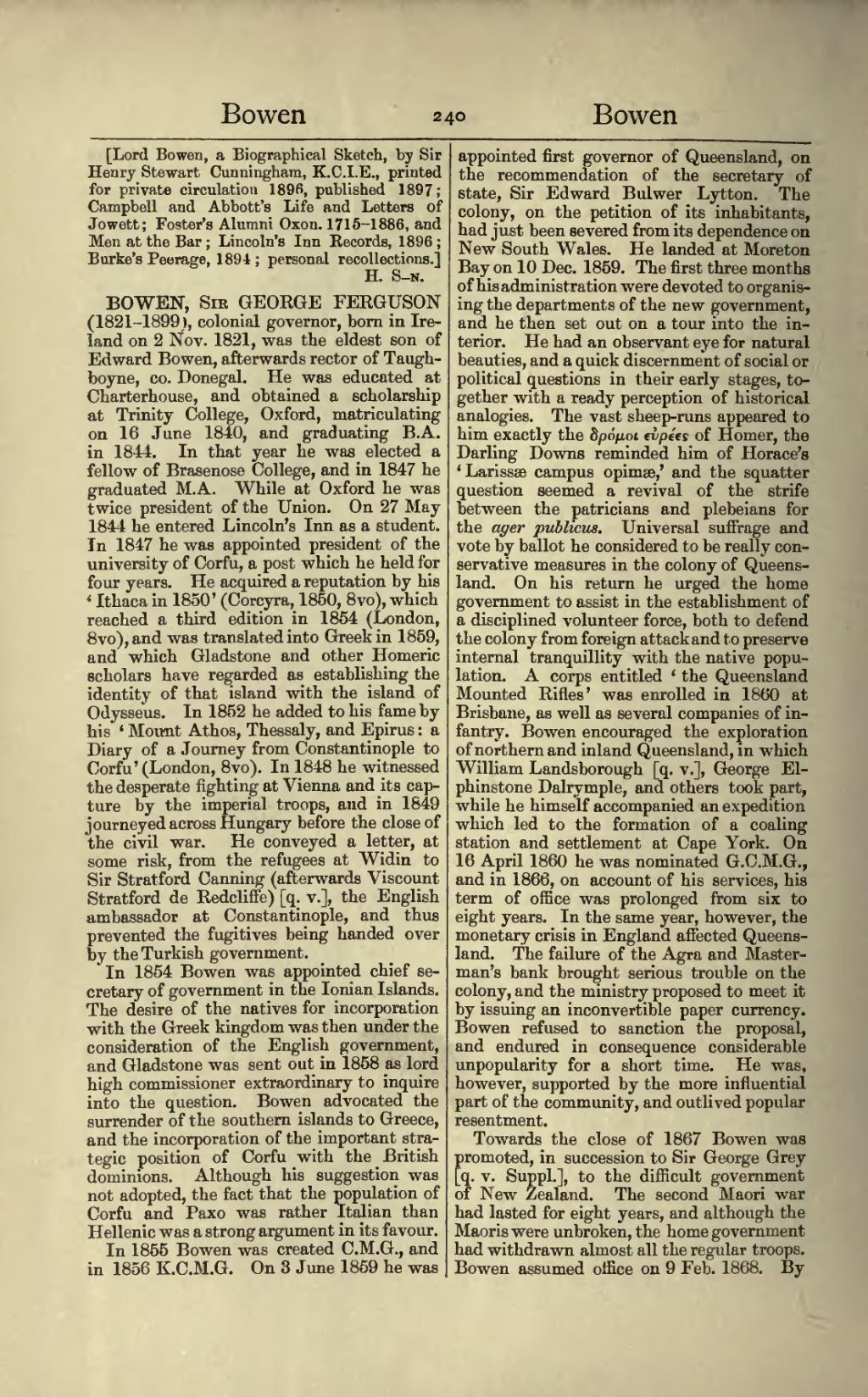[Lord Bowen, a Biographical Sketch, by Sir Henry Stewart Cunningham, K.C.I.E., printed for private circulation 1896, published 1897; Campbell and Abbott's Life and Letters of Jowett; Foster's Alumni Oxon. 1715-1886, and Men at the Bar; Lincoln's Inn Records, 1896; Burke's Peerage, 1894; personal recollections.]
BOWEN, Sir GEORGE FERGUSON (1821–1899), colonial governor, born in Ireland on 2 Nov. 1821, was the eldest son of Edward Bowen, afterwards rector of Taugliboyne, co. Donegal. He was educated at Charterhouse, and obtained a scholarship at Trinity College, Oxford, matriculating on 16 June 1840, and graduating B.A, in 1844. In that year he was elected a fellow of Brasenose College, and in 1847 he graduated M.A. While at Oxford he was twice president of the Union. On 27 May 1844 he entered Lincoln's Inn as a student. In 1847 he was appointed president of the university of Corfu, a post which he held for four years. He acquired a reputation by his 'Ithaca in 1850' (Corcyra, 1850, 8vo), which reached a third edition in 1854 (London, 8vo), and was translated into Greek in 1859, and which Gladstone and other Homeric scholars have regarded as establishing the identity of that island with the island of Odysseus. In 1852 he added to his fame by his 'Mount Athos, Thessaly, and Epirus: a Diary of a Journey from Constantinople to Corfu' (London, 8vo). In 1848 he witnessed the desperate fighting at Vienna and its capture by the imperial troops, and in 1849 journeyed across Hungary before the close of the civil war. He conveyed a letter, at some risk, from the refugees at Widin to Sir Stratford Canning (afterwards Viscount Stratford de Redcliffe) [q. v.], the English ambassador at Constantinople, and thus prevented the fugitives being handed over by the Turkish government.
In 1854 Bowen was appointed chief secretary of government in the Ionian Islands. The desire of the natives for incorporation with the Greek kingdom was then under the consideration of the English government, and Gladstone was sent out in 1858 as lord high commissioner extraordinary to inquire into the question. Bowen advocated the surrender of the southern islands to Greece, and the incorporation of the important strategic position of Corfu with the British dominions. Although his suggestion was not adopted, the fact that the population of Corfu and Paxo was rather Italian than Hellenic was a strong argument in its favour.
In 1855 Bowen was created C.M.G., and in 1856 K.O.M.G. On 3 June 1859 he was appointed first governor of Queensland, on the recommendation of the secretary of state. Sir Edward Bulwer Lytton. The colony, on the petition of its inhabitants, had just been severed from its dependence on New South Wales. He landed at Moreton Bay on 10 Dec. 1859. The first three months of his administration were devoted to organising the departments of the new government, and he then set out on a tour into the interior. He had an observant eye for natural beauties, and a quick discernment of social or political questions in their early stages, together with a ready perception of historical analogies. The vast sheep-runs appeared to him exactly the δρόμος εὐρίες of Homer, the Darling Downs reminded him of Horace's 'Larisssæ campus opimæ,' and the squatter question seemed a revival of the strife between the patricians and plebeians for the ager publicus. Universal suffrage and vote by ballot he considered to be really conservative measures in the colony of Queensland. On his return he urged the home government to assist in the establishment of a disciplined volunteer force, both to defend the colony from foreign attack and to preserve internal tranquillity with the native population. A corps entitled 'the Queensland Mounted Rifles' was enrolled in 1860 at Brisbane, as well as several companies of infantry. Bowen encouraged the exploration of northern and inland Queensland, in which William Landsborough [q. v.], George Elphinstone Dalrymple, and others took part, while he himself accompanied an expedition which led to the formation of a coaling station and settlement at Cape York. On 16 April 1860 he was nominated G.C.M.G., and in 1866, on account of his services, his term of office was prolonged from six to eight years. In the same year, however, the monetary crisis in England affected Queensland. The failure of the Agra and Masterman's bank brought serious trouble on the colony, and the ministry proposed to meet it by issuing an inconvertible paper currency. Bowen refused to sanction the proposal, and endured in consequence considerable unpopularity for a short time. He was, however, supported by the more influential part of the community, and outlived popular resentment.
Towards the close of 1867 Bowen was promoted, in succession to Sir George Grey [q. v. Suppl.], to the difficult government of New Zealand. The second Maori war had lasted for eight years, and although the Maoris were unbroken, the home government had withdrawn almost all the regular troops. Bowen assumed office on 9 Feb. 1868. By
